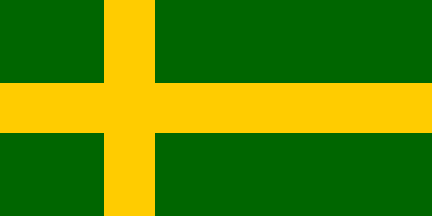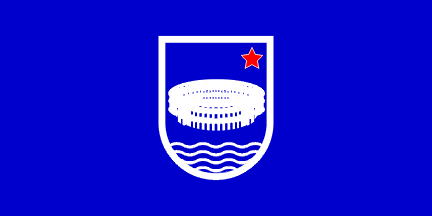
image by Željko Heimer, 5 September 2009

Last modified: 2010-01-30 by dov gutterman
Keywords: pula | istria | pola | cross |
Links: FOTW homepage |
search |
disclaimer and copyright |
write us |
mirrors

image by Željko Heimer, 5 September 2009
See also:
Other sites:
Pula (Pola, all these units have official names in Italian
too) has vert a cross or shield of "nordic" type, the
flag being banner-of-arms similar to discoloured Swedish flag.
This is in opposition to the regulations that the flag should be
of one colour with Coat of Arms in the
middle.I do not know what is official status of that flag
regarding to these regulations, but it is most certainly
extensivly used in the city (including public buildings and local
administration). After World War II the coat of arms of Pula with
the cross was abandoned, and in its place it was used a blue
shield with a white representation of the Arena of Pula. There
are no data on a flag used in the preiod. In mid-1990's the
historical arms of Pula was reintroduced.
Željko Heimer, 1 March 1999
While it is not the capital of the Istria County, the city of
Pula is the largest city and the urban center, situated at the
souther tip of the Istrian peninsula. It has just under 63,000
inhabitants, most of whom live in the city itself. The city was
setteled since the Roman times, that is more then obvious by the
huge well preserved Arena dominating the city landscape. In
modern times it begin it grow in importance since the Austria
begins using the port for naval purposes, and the shipbuilding
and military-related industry was started there in the 18th
century.
The flag and the Coat of Arms currently in use are vert a cross
or, and the green flag with yellow "Scandinavian"
cross. I still have no data on the officiality of these emblems,
i.e. weather they have approval by the Ministry, but they are
still widely used.
In any case, I have acquired good images of Previous
Symbols - the flag and Coat of Arms used after the WWII,
scanned from a Tourist guide of Pula issued in 1988 (that I
remember seing around this time myself, but I was not remembering
enough to be able to draw them without the help).
The coat of arms was a blue shield with a white representation of
the Arena, waves in the base and a red fivepointed star in upper
sinister corner. The flag was blue with the coat of arms in the
middle.
I believe that the would have been adopted in late 1960's or
early 1970's, and they are abandoned in early 1990's. A half a
dozen of stone carved Coat of Arms of this period (together with
some older) that were standing before mostly above the entrances
in the public buildings, are preserved in the museum in Pula in
the fort atop a hill in the middle of the city.
Željko Heimer, 22 Febuary 2004
I was asked: Why does Pula have a Scandanavian cross on its
flag?
It is not an easy question and I don't have any definitive
answer. The thing is that Pula had histrocially coat of arms that
showed a yellow cross in green field. When they reverted to that
coat of arms after some 50 years of not using any and then using
a socilaist style coat of arms, they adopted a flag in shape of a
Scandinavian cross of yellow on green. This is simply the most
logical transformation of the coat of arms to a flag, designed
obviosuly by someone who knew what he was doing (or at least had
a good feeling). In any case, from early 1990's the flag is in
use. I believe that it was not used ever before, and as a matter
of fact, I am not sure if the flag is entirely legal, as it might
have not been approved by the central authorities that the
Croatian law requires it to be before it is being used. And the
reason why, is that the law requires the flag to be of a single
colour with the coat of arms in it. However, the flag of Pula is
nevertheless in use quite frequently and abundantly in the city
as I have noticed myself in the several visits I was there in
last 10 years. What's the origin of green and yellow, beats me...
for the time being. It seems that numerous cities in Istria were
using simple coat of arms with crosses throughout, as a rule
preserved as stone carvings. The colouring (or other
modifications) was added latter, in attempt to differenciate one
from another. But, why green and yellow is yet to be found.
Željko Heimer, 18 March 2007
The web site of the city
shows the coat of arms and its ceremonial variant.
The official gazettes provides us with 2006 and 2009 Statutes,
both including the same description of the city symbols:
- Statut Grada Pule (procišceni tekst), 07.11.2006,
Službene novine Grada Pule, br. 9/2006, 08.11.2006.
- Statut Grada Pula - Pola, 14.07.2009, Službene novine
Grada Pule | Bollettino ufficiale della Città di Pola, br.
7/2009, 15.07.2009.
The coat of arms is the historical coat of arms of Pula, green
shield with a golden Latin cross throughout. The ceremonial form
of the coat of arms adds an ornamental renaissance border to the
shield, with curls at the upper corners and a stylized fleur de
lis and a white ribbon at the top.
Ströhl in his "Städte-Wappen von
Öesterreich-Ungarin", 1904 shows the same coat of arms,
referring to its ancienity. At that time a "Laubkrone"
(leaf crown?) was used atop the shield.
Željko Heimer, 5 September 2009
pn-pu.gif)
image by Željko Heimer, 5 September 2009
pn-pu1.gif)
ceremonial variant
image by Željko Heimer, 5 September 2009
Flag

image by Željko Heimer, 22 Febuary 2004
Coat of Arms
pn-p6.gif)
image by Željko Heimer, 22 Febuary 2004